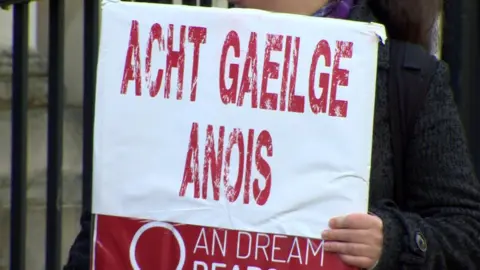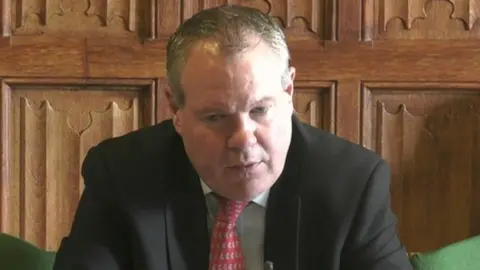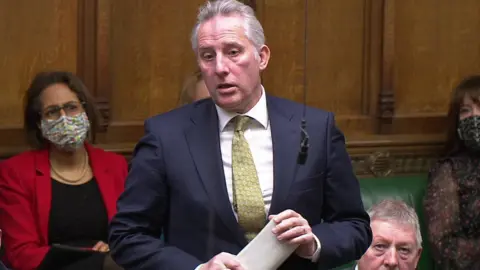Irish and Ulster Scots: DUP and Sinn Féin row delays legislation
 BBC
BBCA political row over the title of the new commissioner for Ulster Scots is being partly blamed for the delay in legislating for a new cultural bill at Westminster, the BBC understands.
Last year the government promised to bring legislation for Irish language and Ulster Scots through Westminster.
It stepped in after the Stormont executive failed to pass the cultural bill but the process has been stalled.
Now it seems the DUP and Sinn Fein are at odds over the commissioner's title.
It is understood the Democratic Unionist Party has argued that the title Ulster Scots commissioner is too narrow and the post should instead be named Ulster British Commissioner.
But Sinn Féin say the role is about promoting language, arts and literature and the title should be Ulster Scots Commissioner.
The Northern Ireland Office now has been tasked with resolving the stand-off.
Meanwhile, the NIO Minister Conor Burns yesterday confirmed that the government still plans to pass the cultural bill at Westminster before the Assembly election but he provided no specific timeline.
Mr Burns said the government wanted to pass the legislation to avoid the issue dominating the May election campaign.
The DUP's Jonathan Buckley said that was "disappointing" and accused the government of being "tone deaf" to unionist concerns.
However, nationalist parties have questioned the delay in introducing language legislation, with Sinn Féin saying the British government "must stop dragging its feet" on the issue.
What has been proposed?
New legislation to protect and enhance both the Irish language and Ulster-Scots was planned as part of the 2020 New Decade New Approach agreement.
The wide-ranging deal restored Stormont's power-sharing government after a three-year gap, but much of its terms are still to be implemented, including language protections.
The 2020 agreement stated legislation would be introduced to "provide official recognition of the status" of both the Irish language and Ulster-Scots with a commissioner appointed for each.
What did the NIO minister say?
Conor Burns appeared before the Northern Ireland Affairs Committee on Tuesday and was asked if language legislation would be pushed through before the forthcoming assembly election on 5 May.
"What I can say, very candidly, is that is our expectation that this is not going to be passed by Stormont before the end of the mandate and dissolution and that we are absolutely expecting that we are going to have to do this in Westminster, and we remain committed to bringing this legislation forward in Westminster," he said.
 UK Parliament
UK ParliamentMr Burns said he could not reveal the expected date.
But he added: "This is not a nationalist or a unionist piece of legislation but I think we can all agree, it's definitely the government's view that it would be a good thing if this was completed and didn't become a contentious element of what is already going to be a contentious election campaign."
What did the DUP say?
Mr Buckley said the Westminster government could not "cherry pick" language provisions of the New Decade New Approach deal while at the same time failing to deal with unionist concerns over post-Brexit trade arrangements at the Irish Sea border.
"Unionism is at its wit's end with hollow commitments from Her Majesty's government on the Northern Ireland Protocol," the DUP assembly member told the BBC's Nolan Show.
"While I respect everybody's right to value a language, to participate in speaking a language, my concern primarily is the constitutional and economic impact of the Irish Sea border on the people of Northern Ireland.
"And you know what? If nationalists and indeed those that push for Irish language elements of New Decade New Approach really value that agreement and really value the input of unionists, they would recognise that a key pledge in that agreement was a pledge to protect and strengthen the UK internal market."
What did Sinn Féin say?
The party's West Belfast assembly member Aisling Reilly called on the government to "get on with implementing its commitments and legislate for an Acht Gaeilge [Irish language legislation]".
"That legislation needs to faithfully reflect what was negotiated and agreed by the two governments and the political parties in the New Decade New Approach," she said.
"Irish language legislation is crucial to delivering rights and guaranteeing protections in law to an ever-growing community of Gaeilgeoirí [Irish speakers] across our island."
Ms Reilly added: "The British government needs to end the delays, honour its commitments and implement its agreements and end the denial of rights to the Irish language community."
Why would the legislation be passed at Westminster instead of Stormont?
Disputes over Irish language rights have been a source of division between Northern Ireland's two largest parties for several years and it has threatened the future of power-sharing.
Last summer, after another crisis at Stormont, Sinn Féin said it would not agree to the appointment of a new DUP first minister without movement on Irish language legislation.
The party then asked Secretary of State Brandon Lewis to introduce the laws at Westminster, saying it was the "only way forward to finally resolve" the standoff.
The DUP's Sammy Wilson objected at the time, warning the government it "must not interfere in devolved issues at the behest of Sinn Féin".
Late last year, the Northern Ireland Office said it was "disappointing that the executive has not progressed legislation" on language and cultural issues.
It added that "in the absence of progress on this matter, the UK government is taking the necessary steps to introduce legislation as soon as parliamentary time allows."
'Zero support'
Meanwhile, a bill that allows the Northern Ireland Assembly to continue to meet for at least six months has received royal assent.
The Northern Ireland (Ministers, Elections and Petitions of Concern) Bill removes the duty on the government to set an assembly election date, if the roles of first and deputy first minister are not replaced this week.
It comes as the executive cannot meet due to the resignation of the DUP's Paul Givan as first minister in protest at the Northern Ireland Protocol, which unionists argue has disrupted trade between Great Britain and Northern Ireland.
On Wednesday, DUP MP Ian Paisley told the House of Commons that the protocol had "zero support from unionists" and that a "one-sided solution will not stand".

Instead, a resolution must be agreed that "united people", he told prime minister's questions.
Prime Minister Boris Johnson responded that any solution required cross-community support and could be fixed with "good will".
He repeated his threat that if negotiations failed between the UK and the European Union then the government would trigger Article 16, a means of taking unilateral safeguarding measures.
